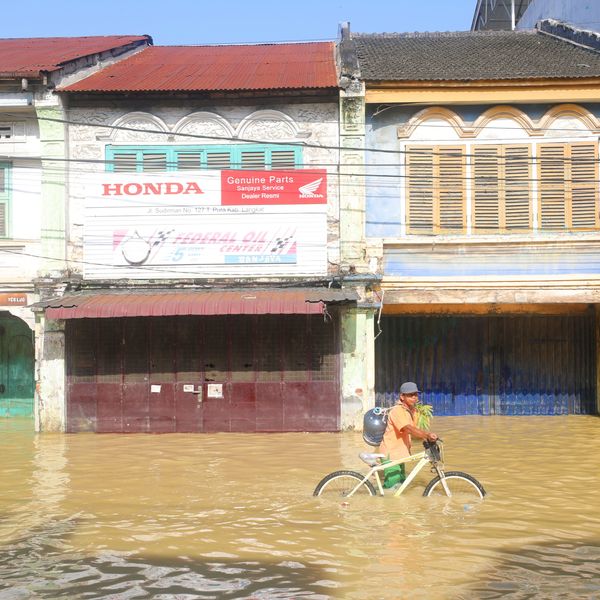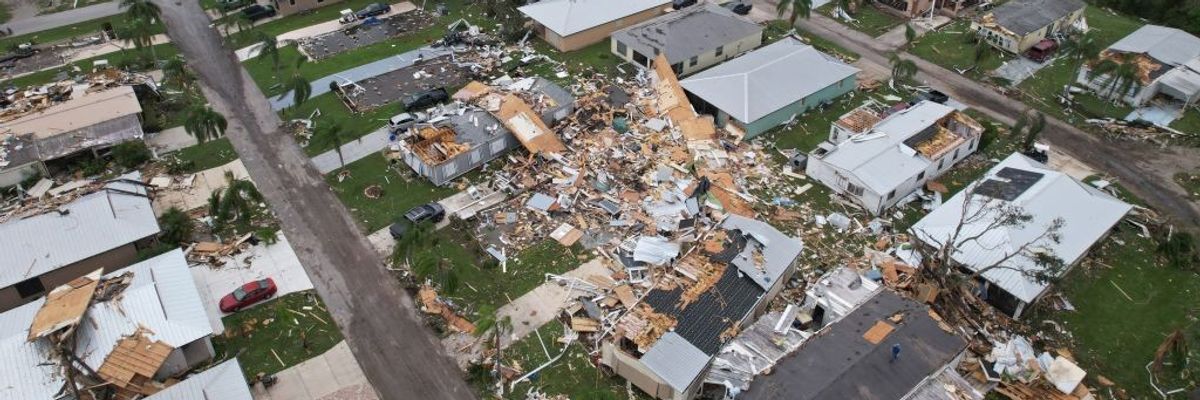With rescue and cleanup efforts underway in Florida following back-to-back disasters wrought by hurricanes Helene and Milton, scientists on Friday released an analysis highlighting how the latter storm was "wetter, windier, and more destructive because of climate change" driven by fossil fuels.
Hurricane categories are based on wind speed, and scientists have connected quick jumps in ratings to the climate emergency. Milton rapidly intensified to Category 5, the highest on the scale, while in the Gulf of Mexico but made landfall late Wednesday as a Category 3 storm—less than two weeks after Category 4 Helene hit Florida and then left a trail of destruction across the Southeast.
Based on modeling, "climate change was responsible for an increase of about 40% in the number of storms of this intensity, and equivalently that the maximum wind speeds of similar storms are now about 5 m/s (around 10%) stronger than in a world without climate change," World Weather Attribution (WWA) said Friday. "In other words, without climate change Milton would have made landfall as a Category 2 instead of a Category 3 storm."
WWA also detailed how the warming climate is connected to the water that Milton left in its wake. As the group said: "In 3 out of the 4 analyzed datasets we find that heavy one-day rainfall events such as the one associated with Milton are 20-30% more intense and about twice as likely in today's climate, that is 1.3°C warmer than it would have been without human-induced climate change. The fourth dataset shows much larger changes."
"These results are based on observational data and do not include climate models and are thus higher than the overarching attribution statement given for Hurricane Helene, where we combined observations and climate models. Nevertheless the results are compatible with those obtained for other hurricanes in the area that have been studied in the scientific literature," WWA continued. "Despite using different temporal and geographical event definitions, as well as different observational datasets and climate models, all these studies show a similar increase in intensity of between 10% and 50% and about a doubling in likelihood. We are therefore confident that such changes in heavy rainfall are attributable to human-caused climate change."
Both storms have generated fresh calls to "make polluters pay" for the damage and deaths caused by extreme weather exacerbated by fossil fuels. There are ongoing state-level lawsuits against Big Oil and recent demands for prosecutors to consider bringing criminal charges against companies, using attribution science to make their cases.
"This study has confirmed what should already be abundantly clear: Climate change is supercharging storms, and burning fossil fuels is to blame," Ian Duff, head of Greenpeace International's Stop Drilling Start Paying campaign, told Reuters about the WWA findings out Friday. "Millions of people across Florida—many of whom lack insurance—now face astronomical costs to rebuild shattered homes and communities."
Milton killed at least 16 people—on top of the over 230 deaths tied to Helene—and could cause up to $50 billion in insured losses for property owners in Florida alone, Fitch Ratings said Thursday. As of early Friday, over 2 million state residents still lacked power, according to CBS News.
While Milton barreled toward Florida on Wednesday, WWA published a report detailing how climate change was a "key driver of catastrophic impacts of Hurricane Helene that devastated both coastal and inland communities."
That followed a Monday analysis from the research organization Climate Central showing that high sea-surface temperatures that fuled Milton's rapid intensification were made 400-800 times more likely by the climate crisis.
U.S. Rep. Ro Khanna (D-Calif.) pointed to both of those studies on social media Friday, in a series of posts promoting his appearance on MSNBC's "All In With Chris Hayes" earlier this week.
During Khanna's MSNBC appearance, he pointed out how Democrats on Capitol Hill have fought for more funding for the Federal Emergency Management Agency (FEMA), which responds to disasters like Milton and Helene, while Republicans have opposed it.
Speaking to reporters last week, before Milton made landfall, Homeland Security Secretary Alejandro Mayorkas warned that FEMA is urgently in need of more money for this hurricane season, which lasts until November.
"We are meeting the immediate needs with the money that we have. We are expecting another hurricane hitting," Mayorkas said in anticipation of Milton. "FEMA does not have the funds to make it through the season."



